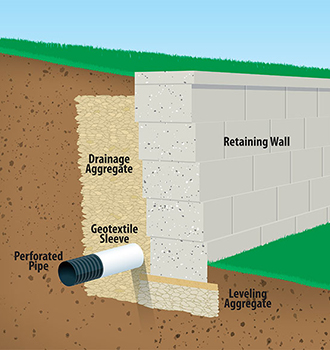Retaining Wall Perforated Drainage Pipe

I was going to use a perforated 100mm flexible pipe in a geo textile sleeve bedded in gravel but i can t find a product that would allow me to t off smaller diameter weep holes at regular intervals what can i use without spending the earth or should i just bing the pipe out of the wall at one.
Retaining wall perforated drainage pipe. However nearly 80 of all residential retaining walls fail at one point or another because of poor drainage. Retaining walls with a height greater than a few feet should also have weep holes that are regularly spaced in the vertical direction forming a grid pattern. You may have to submit plans for your wall and schedule a property inspection to ensure that building a retaining wall won t create drainage problems. With proper retaining wall drainage and construction it can bring a lot of character and function to your landscaping.
Perforated drain behind retaining wall by. Hi i m building a retaining wall in my garden a need to put a drain at the foot of the wall. Retaining walls are a seemingly simple enhancement to any landscaping project. Some of these drains are vented through the front of the retaining wall while others may run the length of the wall and drain out to the sides.
Pipe drains also known as toe drains are perforated pipes that collect water along the length of the wall and drain it to the outside. Dave armstrong having a perforated drain behind a retaining wall makes no sense as the water will exit as quickly as it enters through the perforations. Learning how to build a retaining wall can be fun with these helpful tips. Running along the wall.
Perforated drains allow the water to flow out of the wall preventing it from collapsing under the weight of too much water. This video shows you how to properly install a drainpipe behind your wall for prop. Mar 19 2014 when building a retaining wall lay perforated drainage tubing at the base of the wall slightly above ground level so runoff can drain out without undermining your wall. This should be a perforated pipe to allow water to enter it through the length of the wall.
When i use perforated pipe in a drainage system should the holes go up or down. Another method for relieving hydrostatic pressure is to install a drainage pipe behind the wall. Adding drains to the foundation of your retaining wall drainage is vital. I hear arguments for both methods but it really depends on how the pipe functions in your drainage system before going any further the pipe we are discussing here is heavy duty.
Steven baczek a residential architect from reading mass who specializes in designing durable low energy homes responds. The perforated pipe will carry. Retaining wall leaking drainage rocks.














































